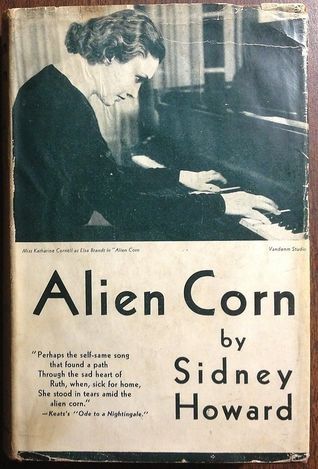
| Title | : | Alien Corn |
| Author | : | |
| Rating | : | |
| ISBN | : | - |
| Language | : | English |
| Format Type | : | Hardcover |
| Number of Pages | : | 189 |
| Publication | : | First published January 1, 1933 |
Alien Corn Reviews
-

This is a powerful play about the struggle to realize one's dreams and breaking through confines set by others that don't work for them. It's a little dated in minor places, but the fact that Elsa and Ottakar were interned for being too German during World War I definitely specifies the setting, and it's obvious that someone is going to be killed with one of Stockton's practice pistols before the end of the play, though the end isn't so obvious. I was looking for info about this play as I was reading it, and there is clearly a similarity between this play and the synopsis of
W. Somerset Maugham's short story, "The Alien Corn," which similarly draws its title from Keats's "Ode to a Nightingale" interpretation of the book of Ruth. I will say that, based on that plot description, that the pianist Elsa Brandt is not a female version of Maugham's protagonist, a male pianist. Watkins is kind of sexist, but that seems intentional, since most of the most brazenly sexist things come from his mouth, but not so much we interpret him as a virulently bad guy (he's not a villain, by any means). On that note, several characters do use the word "sex" in a way that sounds strange--it's confusing in context whether they mean gender (as we would likely now say it, although many grammarians do not approve) or eroticism. I couldn't figure out who Phipps was talking about on the two occasions he refers to "Ray." The first time, he seems to be referring to Stockton, and the second, to Ottakar. No one is identified by that or a similar name in the character list, and the only name that appears in the play, apart from music celebrities like Fritz Kreisler, that does not appear on a character list is Skeats's first name, Hubert, by which his wife addresses him. The play name drops a lot of classical music, but not being a piano specialist, I knew the composer's names, but not necessarily the works. Hearing such music would surely enhance the production dramatically, especially since several of the pieces I do know by name are a powerful fit. A good portion of the Brandts' lines are in German with no translation, and it's not always clear what they mean, so an actor would have to do his or her homework. Ottakar seems to speak German more often than English, and Elsa typically answers in German, although she came to the United States at the age of four. The play also deals with stringent, by the letter applications of rules and the disastrous effects on real people that can have.






